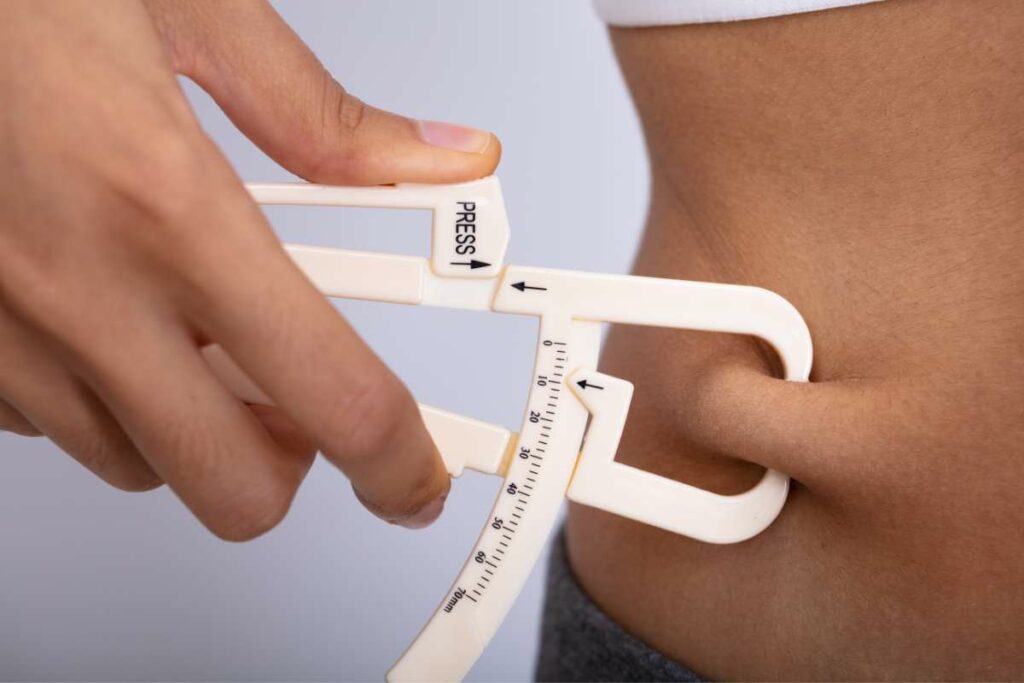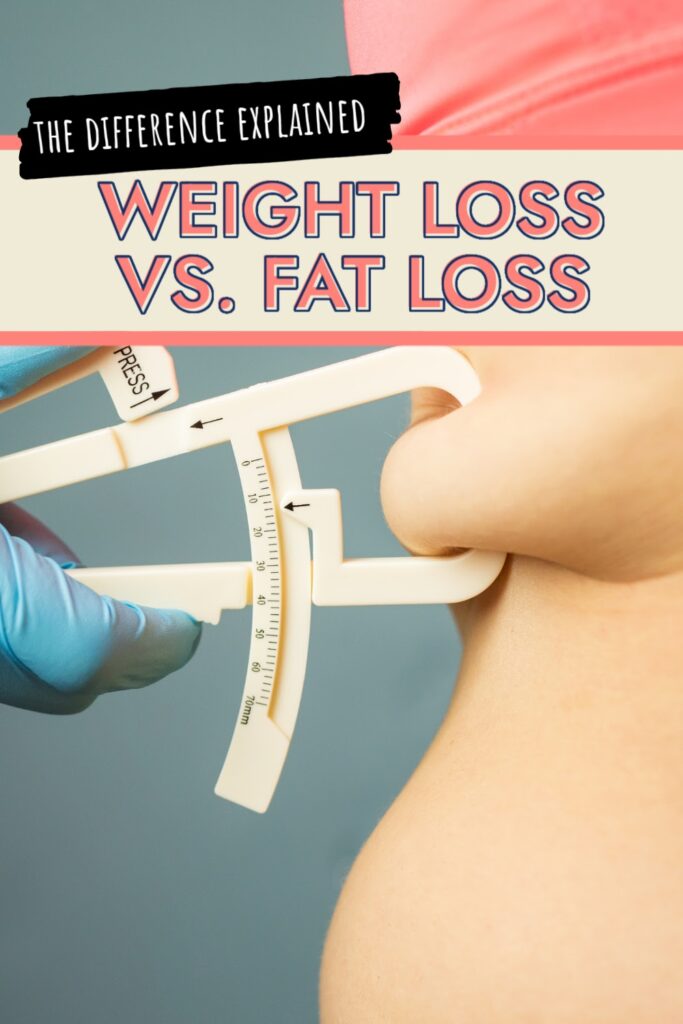Losing Weight VS Losing Fat: Differences Explained
If you’ve found this article, it’s safe to assume that you’re interested in seeing the number on the scale go down. You may see a lot of programs out there offering rapid weight loss or rapid fat loss.
The question is, what’s the actual difference between losing weight vs losing fat? It can be confusing to know what program or plan to pick, especially when you don’t understand the differences.
In this post, we’re going to explain the differences between losing weight vs losing fat. By understanding the differences between the two approaches, you will be able to make better decisions in your fat loss journey.
This post may contain affiliate links, which helps keep this content free. Please read our disclosure for more info.
Weight Loss vs Fat Loss

In simple terms, losing weight refers to a decrease in your overall body weight from muscle, fat, and water losses. Losing fat refers to weight loss from fat only.
We can think of it as: losing fat is getting rid of the unnecessary, or excess, fat on our bodies while losing weight can include losing necessary muscle mass and water weight. Losing fat is definitely the more healthy approach here – and the more desired one as well.
That’s why our program, the 21-day fat loss challenge, is geared towards losing fat instead of losing weight.
Simply put, losing fat should be your goal in your journey to getting healthier.
Losing weight, which refers to the loss of muscle and water instead of just fat, can cause negative health effects. Some of the adverse health effects of losing weight (as opposed to losing just fat) can include:
- Lowered metabolism
- Fatigue
- Increased risk of injury
- Declines in neuromuscular function (muscles), and
- Potential effects on psychological and emotional health
We don’t want to lose muscle mass or just water weight when we’re working towards losing fat.
Related: 10 Foods That Burn Belly Fat Fast
Muscle Weighs More Than Fat
I’m sure you’ve heard that muscle weighs more than fat. This is true, and you shouldn’t lose muscle mass if your primary goal is to get healthier.
Kelsey Wells posted the following images on Instagram. She is about the same weight in both images, but she is thinner and more fit in the image on the right.
1 pound of muscle takes up far less space than 1 pound of fat.
Here’s a post from F45 Training Dee Why on Facebook showing the difference in size of 5 lbs of fat vs 5 lbs of muscle.
Losing muscle mass can be both dangerous and unhealthy. Furthermore, sustaining a healthy amount of muscle mass actually helps you lose fat.
You read that right, muscle helps burn fat when the body is at rest.
If anything, losing muscle mass will slow down your fat-loss process.
If you still aren’t convinced of the importance of maintaining a healthy muscle mass, check out the benefits of doing so. Maintaining healthy muscle mass aids in:
- Regulating healthy blood sugar levels
- Maintaining healthy fat levels, and
- Controlling inflammation
While we’re talking about what “weight” you should be trying to lose vs. not worrying about, let’s talk about water weight.
Our bodies are 80% water, which means we contain a lot of water that contributes to our overall weight.
In the same way we don’t want to lose muscle mass, we also don’t want to focus on losing water weight.
You may be thinking that cutting back on your water will promote weight loss, since so much of our bodies are water, but that’s not accurate or healthy.
Our bodies need water to function properly. Drinking less water is actually counterintuitive to losing fat because it won’t help.
In contrast, drinking enough water actually promotes fat loss. Another great thing water does for us is help transmute carbohydrates and proteins into the bloodstream to metabolize.
Now that we have you on board with the importance of losing fat as opposed to losing weight, you may be wondering how to tell the difference in your own body.
Related: Why Cholesterol and Fat are a VITAL Part of Your Weight Loss Journey
How To Tell if You’re Losing Fat or Weight
It can be difficult to tell the difference on your own, and a scale won’t give you the information you need. With this in mind, let’s discuss how to tell if you’re losing fat or weight.
Using a body fat scale is one way to keep track of your fat loss. This is different than a “traditional” scale.
Body Fat Scale
Etekcity Digital Body Weight Bathroom Scale with Step-On Technology
Staying fit and healthy is just a step away. Simply stepping on the large tempered glass platform and receive immediate results displayed on a sizeable backlit LCD display. Sophisticated sensors ensure that your results are within 0.1 lbs. Of whatever is being weighed, ensuring accurate weight measurement time after time. Click here.
You can purchase a variety of these online and they will provide a more accurate picture of your fat loss.
Another way to determine fat loss is to calculate your body mass index.
Body mass index, also known as BMI, can be used to determine the amount of fat on your body.
The third way to determine the amount of fat on your body is a caliper. A caliper is an instrument that calculates the thickness of your fat in certain locations.

Ways to Promote Fat Loss
Our program, the 21-day fat loss challenge, is all about losing fat on our bodies while promoting healthy muscle mass and water weight.
The best way to shed fat without losing the weight you need to keep is by adjusting your diet and nutrition. Many diets and fat loss programs will ask you to eat too little, which can be dangerous and unhealthy.
Our program is different as we don’t ask you to eat less than what your body needs. We just ask you to adjust what you’re eating – and not permanently either!
Where other programs want to strip you of key nutrients and restrict your calorie intake to dangerous levels, our program focuses on educating you on nutrients and minerals.
We even offer a list of approved foods and non-approved foods so you won’t have to guess at what will help you in the challenge.
You’ll want to keep your protein intake high, as protein actually helps the body burn fat. Staying away from carbohydrates is another way to promote fat loss.
Another great way to lose fat is by exercising.
Don’t overdo it though, as overexercising can actually cause more harm than good.
The 21-Day Fat Loss Challenge program focuses on two exercises to promote fat loss: daily walks and resistance-based circuit training. Both of these exercises help you burn fat without causing much stress on your body.

For a more detailed explanation of how to lose fat quickly, check out our 21-day fat loss challenge. We assure you that if you follow our guide, you will shed fat quickly, safely, and effectively.
Not ready to dive in? That’s okay too! You can try a taster of our 21-day fat loss challenge for free. Get it here.



This blog post provides a clear explanation of the differences between losing weight and losing fat. It emphasizes the importance of focusing on fat loss rather than weight loss, as losing muscle mass and water weight can have negative health effects. The post also provides helpful tips for determining whether you’re losing fat or weight and discusses the benefits of maintaining healthy muscle mass. Overall, this is a great resource for anyone who wants to understand the difference between losing weight and losing fat and make informed decisions about their health journey.